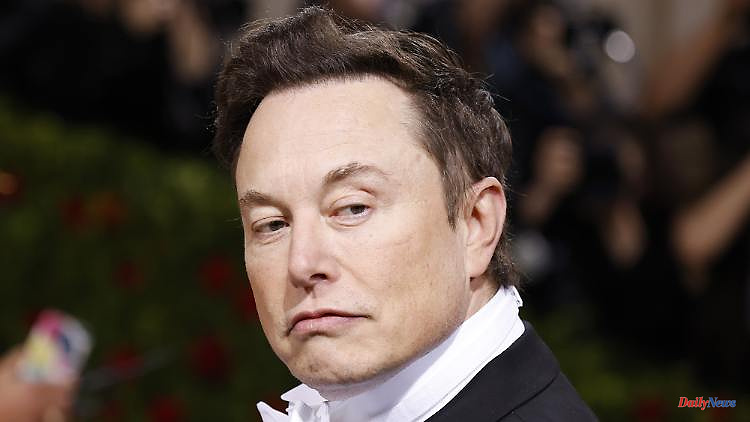Elon Musk wants to change the world. With Tesla and SpaceX he is well on the way. However, the visionary shows a completely different side online: Musk's Twitter profile is peppered with provocations. His posts become more political, his accusations more rabid. And his circle of confidants is getting smaller.
Elon Musk, the self-appointed savior of free speech, is getting stuck. His takeover of the opinion engine Twitter has been on hold for weeks. Although the 50-year-old is causing Twitter shares to fluctuate with his back-and-forth takeover bid and withdrawal, it is unclear whether the purchase will work out. The US stock exchange authority SEC is now interested in the 50-year-old's interest in Twitter. Musk may not have followed the rules when he became a major shareholder, and US shareholders even accuse him of market manipulation. The multimillionaire shouldn't really care.
How he reacts to things he doesn't like has been impressively demonstrated by the richest person on the planet, for example by Twitter boss Parag Agrawal. He explained how the company he runs detects and deletes fake accounts. Musk apparently didn't find that very convincing and tweeted a poop emoji towards Agrawal.
As part of his purchase offer, Musk publicly identified himself as a new voter for the US Republicans and called the US Democrats a "party of division and hatred" who are now planning "a dirty campaign" against him. His tweets have great resonance. With around 95 million followers, Musk's reach is as large as that of former US President Trump at his Twitter heyday. Trump was banned from the platform after belittling the mob that stormed the Capitol after his election defeat.
So why is Musk, who has a passion for future technologies, offering $44 billion to take over Twitter? The network is "the marketplace" of the world where freedom of expression must be saved, says Musk.
As a "freedom of opinion absolutist", the entrepreneur rejects any restriction of free opinion. For example, while providing Internet access via its Starlink satellites to Ukraine, which is under Russian attack, it refuses to block Russian propaganda sites. There is no room for regulation in his libertarian worldview. This is evidenced by his son's illegal California law name, X Æ A-12, as well as the fact that he built the Tesla factory in Brandenburg before he even had final approval to do so. For Musk, individual freedom and the overarching goal count, collateral damage is the price.
Musk's goal is to change the world. His investments "must have some benefit for the world," he said in a 2007 television interview. Just a few years later, the visionary and his company achieved something unprecedented: While Tesla gave the automotive industry the decisive step towards electric propulsion, his space company SpaceX brought the first three space tourists into space and should help colonize Mars in the long term. His company Neuralink is researching a connection between the human brain and machines. His company The Boring Company wants to connect major US cities with tunnels through which shuttles race.
Musk's innovative spirit and belief that technology solves all problems has earned him cult status. What the entrepreneur touches turns to gold, his fans are sure of that. "The way the financial world works now is that things are not valuable because of their cash flow, but because of their proximity to Elon Musk," says Bloomberg columnist Matt Levine. The best example is the cryptocurrency Dogecoin: With only 280 characters, Musk managed to drive the course up first - and then crash it by withdrawing love.
That was not always so. Musk was ridiculed for years in Silicon Valley for his electric car project. The first three SpaceX rockets exploded on launch, Tesla burned a lot of money for years. But Musk fought through.
"He's a genius when it comes to business, but his gift isn't empathy with people," his brother and business partner Kimbal Musk told The Times magazine. Former employees describe Musk as petty, cruel, and moody. According to media reports, workers are downright exploited. "There are countless stories about how difficult he is as a boss," said journalist and author Ashlee Vance, who spoke with more than 200 of his associates for a biography of Musk. In an interview with the Wall Street Journal, Musk described himself as the "nano manager" of his approximately 100,000 employees. Why doesn't he delegate? There is no one who "can do the job better than me," as he told the New York Times.
Musk apparently does not know self-doubt. So he quickly sent a mini submarine to Thailand when he heard that young people were trapped in a cave there. "He wants to prove to the whole world that he's extraordinary," Vance describes the behavior of the visionary, who was bullied and beaten as a school child. But the rescuers rejected Musk's help as inappropriate. "He can push his sub where it hurts," said one of the divers. The offer is just a PR gimmick. There is "absolutely no chance that it will work." Musk then called the rescuer a pedophile.
With Twitter, the eccentric entrepreneur has found his stage, where the spotlight never goes out. Musk likes to get involved, enjoys the attention, tweets more or less useful. Shortly after the start of the war of aggression against Ukraine, he challenged Russian President Vladimir Putin to a duel - "Ukraine is the mission," he tweeted in the direction of the Kremlin. Musk professed to write "at least half of his tweets on the porcelain throne" or claimed that the Egyptian pyramids were "built by aliens." He tweeted that he was taking Tesla private - apparently to hit speculators who had bet on a falling Tesla price. But the announcement did not correspond to reality - this caused trouble with the US Securities and Exchange Commission SEC.
Shortly after the announcement that he would take over Twitter, Musk stressed that the platform absolutely had to be "politically neutral" and "enrage left and right alike". The potential future Twitter owner no longer hides the fact that Silicon Valley is too left-wing and woke culture is too aloof for him. He can't take criticism at all.
In his Musk biography "Powerplay," Tim Higgins describes how the circle of people the multi-billionaire listens to has shrunk over the years. Musk has the means and the spirit of innovation to advance Twitter. He could also make a decisive contribution to the technical progress of the world. However, Musk needs corrective measures. And there seems to be an increasing lack of them.












